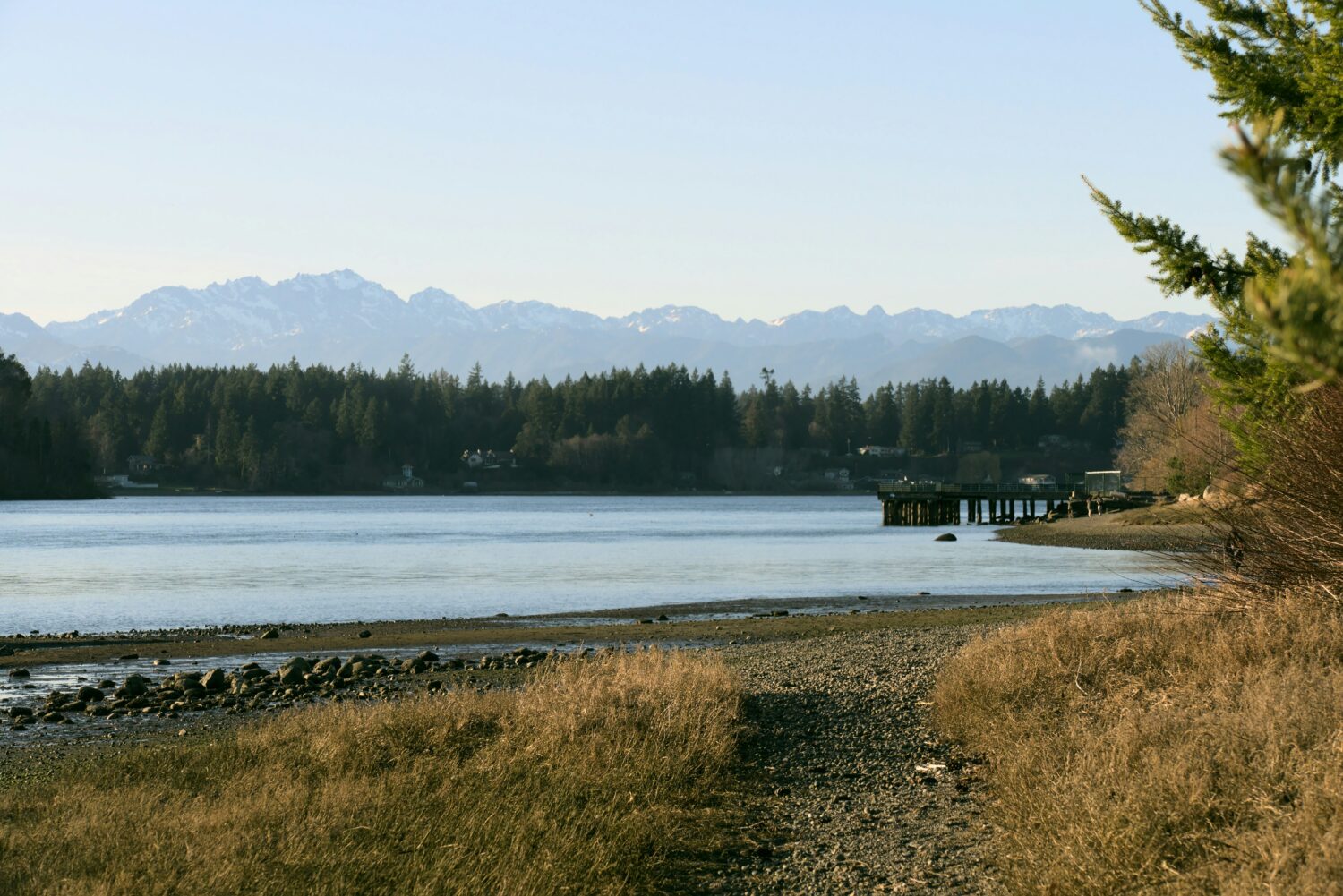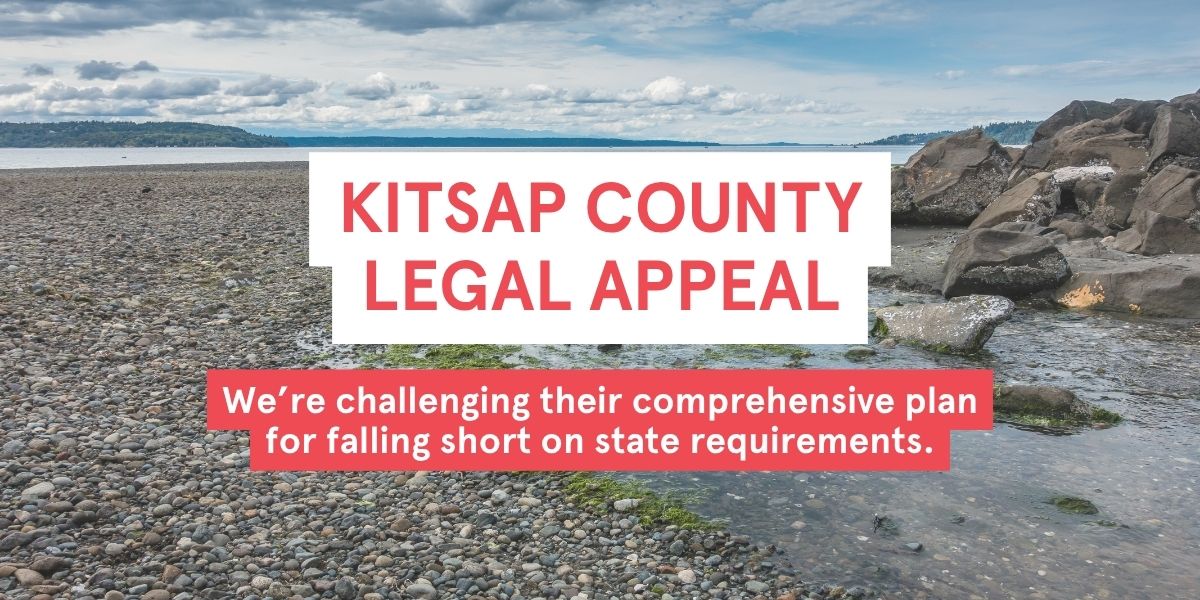Kitsap County Legal Appeal- Update
In April, Futurewise filed our appeal of the Kitsap County comprehensive plan – our first county appeal of the 2024-2027 comprehensive plan update cycle. This will be the first county appeal addressing the updated housing and rural protection requirements from the State Legislature in 2021 (HB 1220) and the Puget Sound Regional Council’s VISION 2050. There are four key issues in our appeal of the Kitsap County comprehensive plan: housing, rural growth, agricultural conservation, and surface and groundwater protection. Our appeal aims to demonstrate that we can successfully increase housing capacity, especially for low-income families, in our cities and towns while still protecting agricultural lands and open spaces for future generations.
Claim 1: Failure to identify sufficient capacity for housing needs, especially affordable housing
Kitsap County, like many places in Washington, has higher than average housing costs, making it especially important to zone for housing options that lower-income households can afford. We argue that Kitsap County’s Comprehensive Plan violates the Growth Management Act (GMA) by failing to identify sufficient capacity of land for housing, including housing for all income groups, and to make adequate provisions for the existing and projected needs of all economic segments. The County’s own Housing Element Technical Analysis outlines a 1,179-unit deficit for households earning 0-80% AMI and a 166-unit deficit for moderate-income households (81-120% AMI).
Kitsap County identified specific regulatory obstacles limiting affordable housing production: high minimum lot sizes, low maximum densities, restrictive building heights, excessive setbacks, and burdensome parking requirements. The analysis by Kitsap County also proposed concrete solutions — increasing densities from 9 to 14 units per acre in Urban Low zones, raising height limits in Silverdale Regional Center, and reducing setback requirements. However, these measures did not make up the 1,179-unit deficit for households earning 0-80% AMI and the 166-unit deficit for moderate-income households (81-120% AMI).
Claim 2: Failure to limit rural growth rates
At the same time, Futurewise argues that Kitsap County’s 2024 Comprehensive Plan violates the GMA by increasing rural development capacity rather than managing and reducing rural growth rates over time. The plan lacks concrete implementation measures to achieve required rural growth reductions.
Rural sprawl increases impervious surfaces (think: buildings and pavement and concrete for roads) and reduces forest cover, and research shows that when total impervious surfaces exceed 5-10% and forest cover declines below 65% of a basin, salmon habitat in streams and rivers is damaged. The plan’s continued allocation of excessive rural growth contributes to habitat fragmentation, increased impervious surfaces, and degradation of critical environmental areas. We argue that the failure to implement active rural growth reduction measures violates the GMA’s mandate to protect and enhance environmental quality while maintaining our state’s high quality of life.

photo credit: Josiah Ferraro; Bremerton
Claim 3: Failure to meet the new requirements to protect people and property from wildfires
Like all Washington counties, Kitsap County experiences dangerous wildfires. The Growth Management Act was amended in 2023 to require comprehensive plans to reduce and mitigate the risk to lives and property from wildfires. Futurewise argued that the comprehensive plan and development regulations do not protect lives and property from wildfires. For example, the comprehensive plan lacks multimodal emergency and evacuation routes that would allow people who do not drive, including children, to safely escape wildfires.
Claim 4: Failure to adequately protect farmlands
The Kitsap County comprehensive plan fails to review or designate agricultural lands of long-term commercial significance, leaving farmland vulnerable to development. This oversight is important given the role of agriculture in the county: the 2022 Census of Agriculture documents that the acres of land in farms in Kitsap County increased from 9,391 acres in 2017 to 9,539 acres in 2022. Total income from farm-related sources in Kitsap County increased from $3.1 million 2017 to $4.8 million in 2022. Average per farm income increased from $23,944 in 2017 to $53,831 in 2022.
By failing to adopt designation criteria and designate and conserve agricultural resource lands of long-term commercial significance, we argue the County has failed to respect natural resource lands, to maintain the production and distribution of locally grown food, and preserve natural resource lands.
Claim 5: Failure to preserve water quality and availability
Finally, we raised concerns about water availability in Kitsap County. Eighty percent (80%) of the Kitsap County population uses groundwater that is pumped from wells and as the population grows, so does the demand for groundwater. The quantity of usable groundwater is limited. As water use increases, water levels decline, groundwater discharges to streams decrease, and seawater intrudes into groundwater.
Comprehensive plans and development regulations must ensure that proposed water uses are compliant with water codes, applicable instream flow rules and the watershed plan, but unfortunately Kitsap County’s comprehensive plan and development regulations were not updated to comply. Without updating the plan with an eye toward water conservation, future generations of Kitsap County residents are left vulnerable to reduced water availability and salmon streams will be degraded.
The Appeals Process
Futurewise began participating in the county comprehensive plan update in 2023, to help achieve Futurewise’s goals to allow more affordable housing, to conserve working farms and forests, and to protect the environment and fish and wildlife habitats. Futurewise advocated for policies and regulations that help achieve these goals.
The appeal was filed with the Growth Management Hearings Board, a state agency that hears appeals that comprehensive plans and development regulations violate the Growth Management Act, the State Environmental Policy Act, and the Shoreline Management Act. The briefing is complete in this appeal and the Board held the oral argument on June 23, 2025. The Board will issue its decision on the appeal by August 18, 2025. The Board can find that the comprehensive plan and development regulations complies with the Growth Management Act or find that it violates the law and then set a deadline for correcting any violations.


